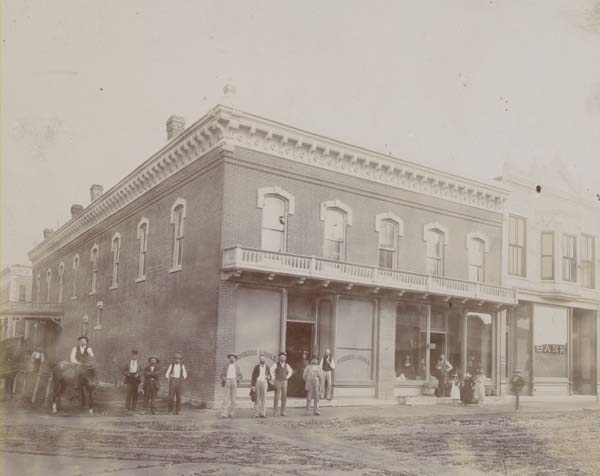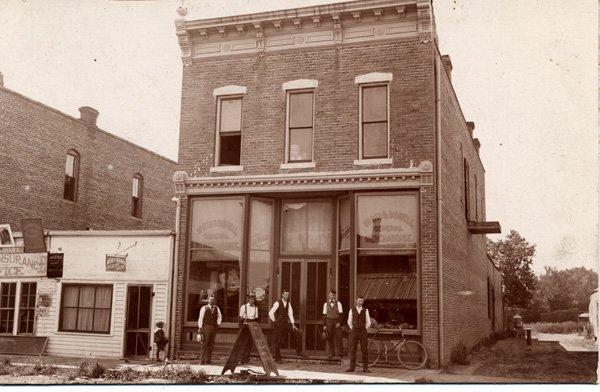It was a nice October evening in 1894 in Kinsley when John F. Marsh left his store, Marsh and Bidwell mercantile, at 213 E. Sixth St. (Navanod Treasures) to walk home. John was a successful business man, but he also was a man who loved his home and family. Perhaps he was thinking of them as he locked the door at 9:30 p.m. He would not go 200 feet before two young ruffians with the intent of robbery demanded he throw up his hands.
“Marsh grappled the nearest man, receiving a 32 ball though the fleshy part of his left forearm, throwing him partially around, when his second assailant shot him with a pistol of a large caliber in the small of the back, the ball passing through his body and lodging under the skin of the abdomen. The robbers ran immediately to their horses and made their escape (16 Oct. 1894, Kinsley Graphic).
When it comes to outlaws and gunslingers, we tend to think of Wyatt Earp and Dodge City, but as this shows, Kinsley also had its share of lawless behavior.
Twenty-six-year-old John Marsh had left Ithaca, NY to come to Kinsley in 1878 in the hopes of improving his poor health. The clean air and climate soon worked its wonders.
In November, 1879, the Edwards Brothers of Kinsley sent John to work at the lumberyard they had opened in Leadville, Colorado the previous March. According to a letter from A.W. Garrison of Kinsley, the silver boom had Leadville going from a population of zero to 20,000 in the past 18 months. There had been a definite need for lumber.

John returned to Kinsley in December and bought into the firm of Edwards Bros. and Noble. The Marsh name was added to the store located on the corner of Marsh St. and 6th Ave.
In 1882, John had an opportunity to help the law when attorney and county treasurer J. W. Crawford had his pony stolen on May 31. Crawford offered a $100 reward and a warrant was issued for the arrest of the thief. Sheriff Billing asked John to aid in tracking the thief, and they took off the next day in a buggy. “With Indian sagacity they trailed the thief without sleep or rest for about 70 miles. Then changing teams, they hastily pursued him through the night….”(June 8, 1882, Kinsley Republican-Graphic)
About midnight they caught up to the thief sleeping under the wagon of an emigrant just two miles west of Wichita. When he was awakened with two six shooters leveled at him, the thief quickly gave up. He was returned to the Kinsley jail and the pony was back in Mr. Crawford’s stable.
The newspaper report ended with, “He said he is sorry he stole the pony, he means sorry he was caught. If every man who loses a horse will show the vim, energy, perseverance and determination shown by Crawford, Billings and Marsh in this case, night riders will hunt beasts of burden in other counties.”
If John got some or all of the reward, it probably came in handy as he married Sue Bidwell on Sept. 14, 1882. I imagine she discouraged this type of adventure after that. (You might remember that Sue Bidwell was aunt to the actress Sue written about last week.) The Bidwell’s would lose a child in August, 1884 and then have baby Mabel in October, 1885.

In 1886, John would partner with his brother-in-law, E. T. Bidwell, to open Marsh and Bidwell Mercantile. In the following years he would become a respected and loved member of the community. He supported many civic projects, sang in a quartet, became an officer in the Edwards Mercantile Bank, served as a councilman, and became major in 1893.
Then came the tragic night of Monday, October 22, 1894. W. J. Potter, a Denver potato salesman, had spent the evening with John. He had just left him for his office at the Alamo House (217 E. Sixth St, Navanod Treasures) when he heard two shots. He and other citizens ran immediately to aid John who was able to talk and recount what had happened. He recognized the men as two he had seen that day loafing around the Alamo Hotel (where they were registered under assumed names). John was carried to his home which was located on two lots on the NE corner of Heath St. and Fifth Ave. He expressed worry and sadness for his family before dying the next day.
Meanwhile, the robbers had fled the scene. They were spotted east of Greensburg on Wednesday evening. From there, they robbed a Mr. Green in Lane County, and finally showed up in Russell Springs on Friday evening. They put their horses in a livery barn and strolled around town.
Two citizens, N. G. Perryman and J. W. Jones, thought the strangers answered the description of the young men who had murdered the Kinsley’s mayor. After sending someone to get a better description, they watched the men and even invited them to a lyceum at the courthouse. Perryman and Jones kept an eye on them as they bedded down in the stable haymow. Shortly before dawn, they cautiously climbed up, pulled the blankets off the sleeping men and took them into custody. The men had a 32 and a 38 and showed their guilt by asking how Mr. Marsh was doing.
Carl Arnold, 17, and William Harvey, 19, were arrested. Both had lived in Kansas and recently been at the Oklahoma Strip. They had never been in trouble before that week when they decided to become robbers. They went to Medicine Lodge, stole two horses and robbed a man in Welsford before getting to Kinsley and murdering John Marsh. He was buried by his infant daughter in Hillside Cemetery.
You’ll have to wait until next week to hear the rest of Arnold and Harvey’s story and how their case affected capital punishment in Kansas.
